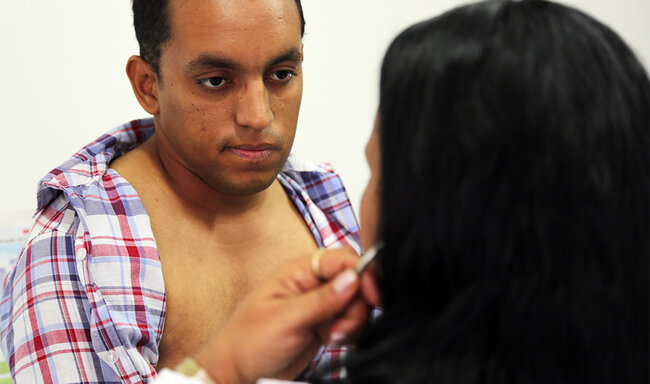
PAHO Director briefed the Organization of American States on health achievements in 2019
Washington, D.C., September 16, 2020 (PAHO)—The Region of the Americas made major advances in expanding access to health in 2019 but faces new challenges in 2020 as a result of the COVID-19 pandemic, the Director of the Pan American Health Organization, Carissa F. Etienne said today.
Speaking at the Organization of American States Dr. Etienne outlined her annual report for 2019, detailing “some of the most compelling health achievements for our region” as well as major challenges ahead.
“Without integrated health and social protection policies, we cannot mitigate against the terrible impact of COVID-19 on our economic livelihoods. Health must address inequities and contribute to lifting people from poverty, not the other way around,” she said, referencing a recent PAHO-ECLAC report.
“Universal health care remains a core tenet of health and development. Even in this time of crisis, we must ensure that everyone, irrespective of income, ethnicity or gender, has access to quality care when they need it, without incurring financial hardship,” Dr. Etienne said.
In the Americas, she said, “We face a challenge without precedent- one that requires strong and well-funded health systems to see us through this crisis and allow us to recover. There is no doubt that countries and cities need significant and sustained interventions across sectors to suppress COVID-19, to protect health gains and to tackle mounting poverty and inequalities. The health of our communities and the health of our economies depend on it.”
Addressing universal health initiatives, Dr. Etienne said, “With the support of PAHO, by the end of 2019, 33 countries and territories in the Americas were implementing actions towards the incremental realization of universal health. These actions included substantial health sector reforms, policy options for health financing, legislation changes, and the definition of strategies, plans, and roadmaps.”
PAHO launched the “Regional Compact on Primary Health Care for Universal Health: PHC 30-30-30”, which establishes goals to eliminate barriers to health access, and increase funding for the first level of care by 30% by 2030, she added.
Public expenditure in health as a fraction of GDP increased from 3.3% to 3.6% in 5 years in Latin America and the Caribbean, and out of pocket expenditures as a proportion of total health expenditure decreased from 31.3% to 28.6%, her report said.
Dr. Etienne said “Unbiased information, transparency and accountability in the allocation and use of resources for medicines and other health technologies continue to be key in building more effective and efficient health systems.“ PAHO is strengthening its Strategic Fund for Access to Medicines and Health Technologies, which increased its procurement of essential medicines, diagnostic kits and vector control supplies by 17 percent as compared to 2018. The total volume of supplies delivered by the Fund in 2019 increased by 81 percent as compared to the previous year.
“The joint work between PAHO Strategic Fund and Mercosur resulted in improved prices and significant cost savings that reached between 50 and 80 percent for most of the countries of the Region. This allowed for the incorporation of WHO recommended medicines and biological molecules that are key therapeutic tools for hepatitis C and breast cancer, while assuring access, quality, and availability,” Dr Etienne said.
The PAHO Director cited advances in the introduction of new vaccines in the Americas, but warned that “We continue to witness the devastating effects that reduced vaccination coverage can have for our most vulnerable populations.”
Noting that non-communicable diseases such as diabetes, obesity, high blood pressure, cancer and tobacco use are continuously increasing, Dr. Etienne said PAHO has been working with partners including agencies in the Inter-American System to reduce the burden and impact of these diseases.
She also detailed PAHO’s work in disease elimination, environmental determinants of health, and the fight against antimicrobial resistance. On health emergencies, Dr. Etienne said PAHO deployed “experts and supplies to all emergencies with potential health impacts in 22 countries and territories, within 48 hours of onset or request for support.”
In closing, she said “We at PAHO are working assiduously to assist your ministries of health in responding to this crisis. Unfortunately, our region has become the epicenter of the COVID-19 pandemic, with cases increasing in nearly every country, and in some countries at very alarming rates. I would ask you again to please share with your governments and constituents at home that it is never too late to turn this epidemic around. Leaders must step up to take action, and citizens must embrace new measures. We must all do what we can to mitigate the impact of this terrible disease.”

